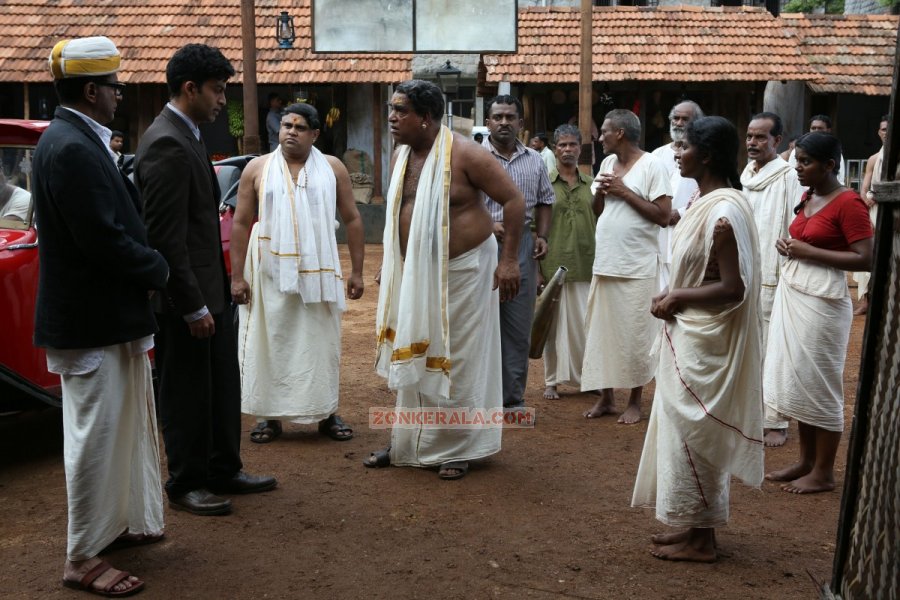Written and Directed by G Aravindan
Cinematography Sunny Joseph
Editing KR Bose
Music Salil Choudhary
Starring Mohanlal, Neena Gupta, Neelanjan Mitra, Shobhana, Padmini
Vasthuhara or The Dispossessed, Aravindan's final film, takes up a theme that is of historical significance. But instead of treating it in its broader context, Aravindan pares it down to the personal, which in turn reflects the larger society around it. Aravindan's cinematic swansong is a portrait of a people who have been deprived not only of their land and wealth, but their very identities, making them refugees in their very own land.
The film opens with newsreel footage of scores of people migrating from East to West Bengal during the post-independence partition, as a voiceover describes the suffering the migrants are put through. From there, we cut to 1971 in Calcutta and are introduced to Venu (Mohanlal), a Malayalee officer at the Rehabilitation Ministry who is involved in relocating refugees based in Calcutta to the Andaman islands.
One day he is approached by Arathi (Neelanjan Mitra), a middle-aged Bengali woman who requests him to deport her to the islands so that she and her two grown-up children can escape from their impoverished lives in Calcutta. The woman comes across Venu as being familiar, be he is unable to figure out how. Further probing reveals disturbing truths about Arathi's connection with Venu's family, and her daughter Damayanti's (Neena Gupta) dislike for Malayalees. We do not see much of her son, except in the scene when Damayanthi takes her to him, who is under hiding due to his involvement in the Naxalite movement.
Aravindan being a high-brow intellectual himself, is apparently disdainful of the pretensions of the Malayalee, as is evident in the scene where a group of Malayalees in Calcutta discuss the greats of Bengal literature surrounded by food and drinks but are apparently oblivious to the harsh reality that surrounds them. Often, the greed of the upper classes in Kerala when it comes to property is highlighted in this film rather explicitly, which is unusual for an Aravindan film.
Based on a novel of the same name by CV Sreeraman, The Dispossessed is deeply humane in its regard for the woes of the expatriates, though Aravindan is never vocal about his empathy. He prefers to give us small visual cues from which we have to relate to the whole.
Like in his other work, The Dispossessed takes on a loose narrative structure, taking occasional detours by focusing on the faces of refugees as they are being transported to the islands, intercut with images of a Durga Puja, one of the most important festivals in Bengal, and the immersion of the Durga idol in the Ganges. The film ends with the refugees being transported in a ship, followed by newsreel footage of the exodus of 1971 and the India-Pakistan war that eventually culminated in the creation of Bangladesh after another round of horrible bloodshed. The downtrodden of the earth are indeed a condemned lot.
Cinematography Sunny Joseph
Editing KR Bose
Music Salil Choudhary
Starring Mohanlal, Neena Gupta, Neelanjan Mitra, Shobhana, Padmini
Vasthuhara or The Dispossessed, Aravindan's final film, takes up a theme that is of historical significance. But instead of treating it in its broader context, Aravindan pares it down to the personal, which in turn reflects the larger society around it. Aravindan's cinematic swansong is a portrait of a people who have been deprived not only of their land and wealth, but their very identities, making them refugees in their very own land.
The film opens with newsreel footage of scores of people migrating from East to West Bengal during the post-independence partition, as a voiceover describes the suffering the migrants are put through. From there, we cut to 1971 in Calcutta and are introduced to Venu (Mohanlal), a Malayalee officer at the Rehabilitation Ministry who is involved in relocating refugees based in Calcutta to the Andaman islands.
One day he is approached by Arathi (Neelanjan Mitra), a middle-aged Bengali woman who requests him to deport her to the islands so that she and her two grown-up children can escape from their impoverished lives in Calcutta. The woman comes across Venu as being familiar, be he is unable to figure out how. Further probing reveals disturbing truths about Arathi's connection with Venu's family, and her daughter Damayanti's (Neena Gupta) dislike for Malayalees. We do not see much of her son, except in the scene when Damayanthi takes her to him, who is under hiding due to his involvement in the Naxalite movement.
Aravindan being a high-brow intellectual himself, is apparently disdainful of the pretensions of the Malayalee, as is evident in the scene where a group of Malayalees in Calcutta discuss the greats of Bengal literature surrounded by food and drinks but are apparently oblivious to the harsh reality that surrounds them. Often, the greed of the upper classes in Kerala when it comes to property is highlighted in this film rather explicitly, which is unusual for an Aravindan film.
Based on a novel of the same name by CV Sreeraman, The Dispossessed is deeply humane in its regard for the woes of the expatriates, though Aravindan is never vocal about his empathy. He prefers to give us small visual cues from which we have to relate to the whole.
Like in his other work, The Dispossessed takes on a loose narrative structure, taking occasional detours by focusing on the faces of refugees as they are being transported to the islands, intercut with images of a Durga Puja, one of the most important festivals in Bengal, and the immersion of the Durga idol in the Ganges. The film ends with the refugees being transported in a ship, followed by newsreel footage of the exodus of 1971 and the India-Pakistan war that eventually culminated in the creation of Bangladesh after another round of horrible bloodshed. The downtrodden of the earth are indeed a condemned lot.




